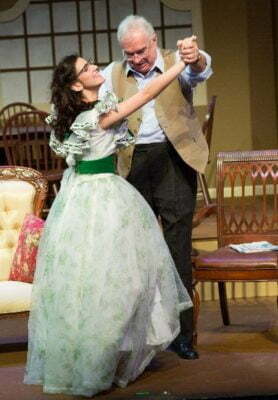The Last Night of Ballyhoo
Broward Stage Door Theatre
Written by Alfred Uhry
Directed by Hugh Murphy
Atlanta Social Life Transcends World News
Kudos to playwright Alfred Uhry. Just as in his Pulitzer Prize and Academy Award Winning play and movie, “Driving Miss Daisy,” he has once again mined the world of Southern Jewry for a heartwarming story transcending ethnic and regional limitations.
The tale is set in 1939 Atlanta where two widows, each with one adult daughter, live together but have very different life experiences and outlooks.

Cheerful, somewhat scatterbrained Reba Freitag (Janet Weakley) enjoyed a happy marriage to a productive husband. Embittered, ambitious Boo Levy (Miki Edelman) wed a wastrel. Reba ‘s highly successful daughter, Sunny (Mary Sansone) is currently in her senior year at Wellesley. Boo’s daughter, Lala (Greyssan Felipe), on the other hand, is a college dropout who fails at every bird-brained endeavor. These highly assimilated German Jews live on the “right” side of Atlanta with kindly, affluent Uncle Adolph (Larry Kent Bramble), who supports them quite comfortably via the family business: The Dixie Bedding Company.
This top of this multi-layered plot examining “haves vs. have-nots,” depicts a Jewish social hierarchy as stringent and separated as any racial or religious divide as it also pits tradition against assimilation and youth against age. As the play opens, the assimilated German Jews follow the path of all their acquaintances and decorate their Christmas tree (although there is some doubt as to whether it should actually be topped by a star). Their lives echo that of the wealthy around them and if they are unwelcome at country clubs, they can form their own: the Standard Club for the wealthy, the Progressive Club for the “others.”
Because the play is set in the world of the Standard Club, the plot focuses the major social event of their season: the Ballyhoo Holiday Ball — described perceptively as “A lot of Jews in expensive clothes dancing around the country club wishing they could kiss their elbows and turn into Episcopalians.”
So intense is the focus on Ballyhoo that news of the world scarcely dents anyone’s consciousness. While Adolph reads newspapers brimming with international news of Hitler’s 1939 invasion of Poland, Lala focuses on the local, Atlanta premier of “Gone with the Wind,” and Boo, in turn, obsesses on whether or not her daughter will have a date for the big night.
The dance looms and of course, romantic interests enter: Joe Farkas (Alex Salup), a New York “kike,” and “Peachy Weil (Stephen Kaiser), an absurd scion of the upper class
Are we in the midst of an engaging romantic comedy watching how the young people pair up, is this the tale of an outsider (faint echoes of “The Glass Menagerie”), or are we exploring social and religious prejudices? All! Playwright Uhry avoids the trap of expectancy. One surprise occurs when Reba knits garments for the family. Because she appears scatterbrained, the audience expects that she will never complete any project. Untrue! This is a microcosm of character development because there is more to each character than initially appears, and the fine skills of the actors match that of the playwright, making the play consistently interesting.
Most compelling and cathartic is the ending, which would be a spoiler to reveal. Go and see this 1997 Tony Award-winning play for yourself!
Recommended
Beverly Friend, Ph.D.
Member ATC
Broward Stage Door Theatre, 8036 W Sample Rd Coral Springs, Fl 33065. 954-344-7765 Tickets $38, 8 p.m. Friday and Saturday, 2 p.m. Wednesday, Saturday and Sunday through December 31.
